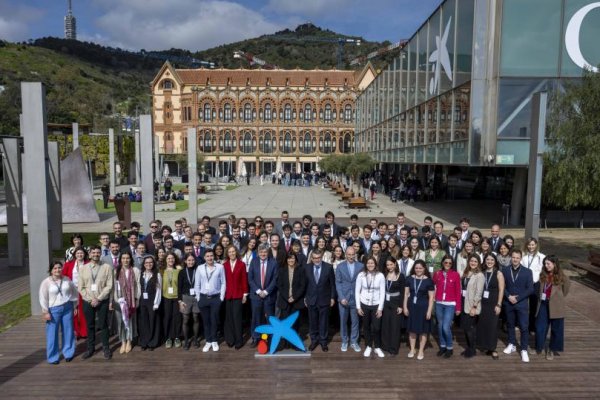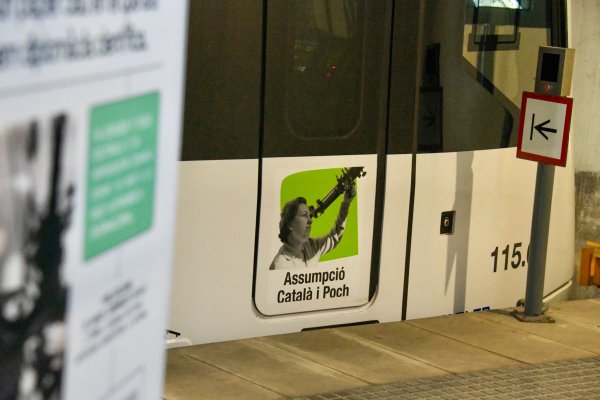The Institute of Cosmos Sciences of the University of Barcelona has welcomed four new researchers who have joined our institute thanks to the "La Caixa" Foundation fellowships.
Through the doctoral INPhINIT fellowships and the postdoctoral Junior Leader fellowships, the ”la Caixa” Foundation aims to both retain and attract talent to foster excellence in research.
The fellowships not only offer competitive salaries, but also include a robust cross-disciplinary training programme. In the case of doctoral fellowships, the focus is on strengthening areas such as scientific communication, researchers’ emotional well-being, leadership and funding opportunities. Meanwhile, the postdoctoral fellowships are designed to foster an independent scientific career, promoting innovation and leadership as key pillars for professional development.
“These fellowships represent a first-class opportunity for the researchers who have received them, but also for society as a whole. Because with the support of their research we’re investing in disciplines that contribute to the well-being of citizens and the construction of a better future for all,” explained the general manager of the ”la Caixa” Foundation, Josep Maria Coronas, during the fellowship award ceremony at the CosmoCaixa Science Museum in Barcelona.
The ”la Caixa” Foundation Fellowships are the most prestigious among those promoted by private entities in Spain and Europe, both in terms of the number awarded and the diversity of disciplines covered. In total, the Foundation will allocate more than 21 million euros to this cohort of doctoral and postdoctoral fellowship recipients. Both programmes have been co-funded by the European Commission through the Marie Skłodowska-Curie COFUND Actions, as part of the Horizon 2020 framework programme.
Doctoral INPhINIT
- Total grant per fellowship: 161,200 euros
- Duration: 4 years
- Applications received: 1,502
- Fellowships awarded: 60
- Areas of study: all disciplines
Postdoctoral Junior Leader
- Total grant per fellowship: 305.100 euros
- Duration: 3 years
- Applications received: 597
- Applications received: 40
- Areas of study: health and life sciences, technology, physics, engineering and mathematics
ICCUB's new additions
We are glad to welcome these four new members to our institute, who will help in advancing science in their respective fields.
-
Marisol Traforetti has been awarded the Doctoral INPhINIT Fellowship to study the link between cosmological observations and theoretical physics beyond the standard cosmological model with ICREA-ICCUB researcher Raúl Jiménez. Their goal is to shed light on the “open questions” in cosmology and fundamental physics with a variety of tools, including Physics Informed Neural Networks. To achieve this, they will construct state-of-art algorithms in the framework of deep learning neural networks.
-
Stefano Trezzi has been awarded the Doctoral INPhINIT Fellowship to pursue a PhD with ICREA-ICCUB researcher Roberto Emparan on one of the major challenges of modern theoretical physics: how to combine general relativity and quantum mechanics into a theory of quantum gravity. They are approaching this problem by studying black holes, since both gravity and quantum effects are crucial for understanding them fully. In particular, they are probing their quantum properties at low temperatures, where quantum gravity effects are most important and studying how quantum fluctuations of the black hole geometry affect the absorption and emission of waves, and their deformability under external forces.
-
Bernat Capdevila has been awarded the Junior Leader Postdoctoral Fellowship to do push the boundaries on exploring New Physics beyond the Standard Model of elemental particles. With the LHC entering its precision era, low-energy phenomenology is key to testing the Standard Model. His main research line will focus on anomaly detection using Machine Learning and Simulation-Based Inference to bypass challenges in high-dimensional parameter spaces and infer unmeasured observables. In a second research line, he will improve computational methods for extracting the CKM matrix element Vub from inclusive decays using deep learning, which will help making the Unitarity Triangle an even stronger test of the SM.
-
Giuliano Iorio has been awarded the Junior Leader Postdoctoral Fellowship to pursue pioneering research aimed at solving a mystery of “Galactic” proportion. His project focuses on RR Lyrae stars—a class of variable stars whose luminosity changes periodically and which are traditionally considered among the oldest stars in our Galaxy.
However, Dr. Iorio and other researchers have uncovered a puzzling subgroup of RR Lyrae stars that display chemical and kinematic properties similar to much younger stellar populations. Dr. Iorio’s research aims to address this conundrum by developing new theoretical models and improving the characterisation of these enigmatic stars. The project’s findings promise to challenge decades-old interpretations of RR Lyrae stars, offering new insights into stellar and binary evolution and the formation history of the Milky Way.



